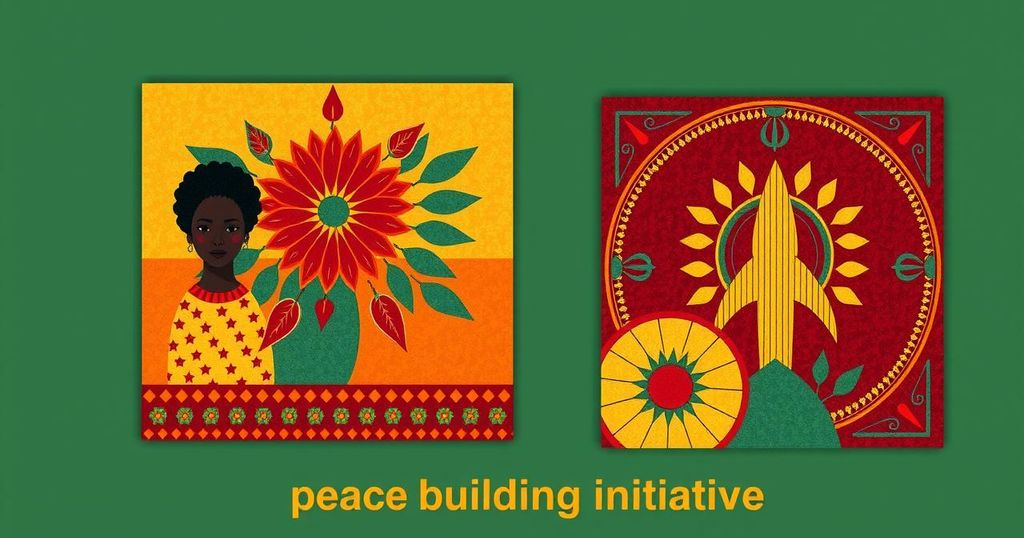The South Sudan government, alongside UNDP and UNICEF, launched two peacebuilding projects aimed at reducing community violence and enhancing resilience, funded by UN Peacebuilding Fund and KOICA. The initiatives focus on empowering local communities, especially youth and women, to combat violence and promote peace, addressing the root causes of conflict effectively.
The Government of South Sudan has partnered with the United Nations Development Programme (UNDP) and UNICEF to unveil two substantial peacebuilding initiatives aimed at reducing community violence and enhancing resilience in conflict-affected regions. Funded by the UN Peacebuilding Fund and the Korea International Cooperation Agency (KOICA), these projects prioritize the empowerment of local communities, youth, and women in peace efforts.
At the launch event in Juba, Minister of Peacebuilding Stephen Par Kuol emphasized the significance of community-centric approaches in securing sustainable peace. He stated, “This project is very important and timely because it is community-centered. We must go beyond violence reduction and aim to end community violence entirely.” He highlighted the leaders’ responsibility to ensure the safety and security of their communities.
The first initiative, titled “Community Violence Reduction Partnerships with White Nile and Sobat River Communities,” is allocated a budget of USD 4 million for a 36-month duration. It focuses on addressing insecurity along the White Nile and Sobat River corridor by reintegrating conflict-affected youth, enhancing livelihoods, and fostering social cohesion through trauma healing and psychosocial support.
The second project, “Peacebuilding and Preventing Violent Extremism in East Africa,” involves South Sudan, Kenya, and Somalia with a budget of USD 4.8 million. It aims to bolster community resilience, particularly among youth and women, and will be implemented in regions such as Eastern Equatoria, Warrap State, and Western Bahr el Ghazal.
UNDP South Sudan’s Resident Representative Mohamed Abchir underscored the necessity for collaborative efforts to tackle the root causes of violence. He remarked that the projects reaffirm a collective commitment to promoting reconciliation and empowering various community groups. Abchir expressed gratitude to the Peacebuilding Fund and KOICA for their unwavering support, stating, “We want to thank all our donors and partners for their continued commitment to peace in South Sudan.”
Pia Philip, the undersecretary at the peacebuilding ministry, stated that community involvement is vital for the projects’ success. He noted that the initiative aims to build resilience amid challenges posed by checkpoints along strategic corridors, while asserting the importance of community engagement in achieving sustainable peace.
Additionally, the projects will address violent extremism through peace education, countering hate speech, and supporting economic empowerment. They are designed to enhance local mechanisms for conflict prevention and provide skills training for youth and women, bolstering their engagement in peacebuilding efforts.
The Ministry of Peacebuilding reaffirmed its commitment to collaborating with civil society groups and local communities, with Minister Par stressing the importance of traditional leadership in achieving the projects’ objectives. He stated, “Juba is not South Sudan. South Sudan is out there, where our people are.”
These peacebuilding initiatives aim to address socio-economic challenges, promote trauma healing, and bolster community resilience amidst ongoing violence and instability in South Sudan. The launch comes at a crucial time as the nation endeavors to restore peace and stability.
In conclusion, the South Sudanese government’s partnership with UNDP and UNICEF to inaugurate two significant peacebuilding projects marks a pivotal step towards reducing community violence and enhancing resilience. With a focus on empowering local communities, especially youth and women, these initiatives aim to address the root causes of conflict and promote sustainable peace. The collaborative effort from various stakeholders is essential for ensuring the successful implementation of these vital projects.
Original Source: www.radiotamazuj.org






